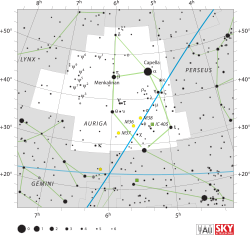|
| Psi4 Aurigae (ψ4) |  | Observationsdata
Epok: J2000.0 |
|---|
| Stjärnbild | Kusken |
|---|
| Rektascension | 06t 43m 04,97107s[1] |
|---|
| Deklination | +44° 31′ 28,0220″[1] |
|---|
Skenbar magnitud ( ) ) | +5,02[2] |
|---|
| Stjärntyp |
|---|
| Spektraltyp | K5 III[3] |
|---|
| U–B | +1,83[2] |
|---|
| B–V | +1,48[2] |
|---|
| Astrometri |
|---|
Radialhastighet ( ) ) | -77,35 ± 0,23[4] km/s |
|---|
| Egenrörelse (µ) | RA: -45,43[1] mas/år
Dek.: -29,97[1] mas/år |
|---|
Parallax ( ) ) | 10,08 ± 0,33[1] |
|---|
| Avstånd | 320 ± 10 lå (99 ± 3 pc) |
|---|
Absolut magnitud ( ) ) | +0,06[5] |
|---|
| Detaljer |
|---|
| Radie | 33[4] R☉ |
|---|
| Luminositet | 245[4] L☉ |
|---|
| Temperatur | 3 970 ± 41[6] K |
|---|
| Metallicitet | 0,10 ± 0,08[6] dex |
|---|
| Vinkelhastighet | 4,8[4] km/s |
|---|
| Andra beteckningar |
|---|
| ψ4 Aur, 55 Aurigae, BD+44° 1518, FK5 2517, HD 47914, HIP 32173, HR 2459, SAO 41288 [7] |
Psi4 Aurigae (ψ4 Aurigae, förkortat Psi4 Aur, ψ4 Aur) som är stjärnans Bayerbeteckning, är en ensam stjärna[8] belägen i den östra delen av stjärnbilden Kusken. Den har en skenbar magnitud på 5,02[2] och är svagt synlig för blotta ögat där ljusföroreningar ej förekommer. Baserat på parallaxmätning inom Hipparcosuppdraget på ca 10,1[1] mas, beräknas den befinna sig på ett avstånd på ca 320 ljusår (ca 99 parsek) från solen.
Egenskaper
Psi4 Aurigae är en orange till röd jättestjärna av spektralklass K5 III[3] och visar ett signifikant överskott av kisel i dess atmosfär.[9] Den har en radie som är ca 33[4] gånger större än solens och utsänder från dess fotosfär ca 245[4] gånger mera energi än solen vid en effektiv temperatur på ca 3 970[6] K.
Källor
- Den här artikeln är helt eller delvis baserad på material från engelskspråkiga Wikipedia, tidigare version.
Referenser
- ^ [a b c d e f] van Leeuwen, F. (2007), "Validation of the new Hipparcos reduction", Astronomy and Astrophysics, 474 (2): 653–664, arXiv:0708.1752 , Bibcode:2007A&A...474..653V, doi:10.1051/0004-6361:20078357.
- ^ [a b c d] Johnson, H. L.; et al. (1966), "UBVRIJKL photometry of the bright stars", Communications of the Lunar and Planetary Laboratory, 4 (99), Bibcode:1966CoLPL...4...99J.
- ^ [a b] Roman, Nancy G. (July 1952), "The Spectra of the Bright Stars of Types F5-K5", Astrophysical Journal, 116: 122, Bibcode:1952ApJ...116..122R, doi:10.1086/145598.
- ^ [a b c d e f] Massarotti, Alessandro; et al. (January 2008), "Rotational and Radial Velocities for a Sample of 761 HIPPARCOS Giants and the Role of Binarity", The Astronomical Journal, 135 (1): 209–231, Bibcode:2008AJ....135..209M, doi:10.1088/0004-6256/135/1/209.
- ^ Anderson, E.; Francis, Ch. (2012), "XHIP: An extended hipparcos compilation", Astronomy Letters, 38 (5): 331, arXiv:1108.4971 , Bibcode:2012AstL...38..331A, doi:10.1134/S1063773712050015.
- ^ [a b c] Prugniel, Ph.; et al. (2011), "The atmospheric parameters and spectral interpolator for the MILES stars", Astronomy & Astrophysics, 531: 25, arXiv:1104.4952 , Bibcode:2011A&A...531A.165P, doi:10.1051/0004-6361/201116769, A165.
- ^ "psi04 Aur". SIMBAD. Centre de données astronomiques de Strasbourg. Hämtad 2017-09-28.
- ^ Eggleton, P. P.; Tokovinin, A. A. (September 2008), "A catalogue of multiplicity among bright stellar systems", Monthly Notices of the Royal Astronomical Society, 389 (2): 869–879, arXiv:0806.2878 , Bibcode:2008MNRAS.389..869E, doi:10.1111/j.1365-2966.2008.13596.x.
- ^ Franchini, M.; et al. (January 2004), "Synthetic Lick Indices and Detection of α-Enhanced Stars", The Astrophysical Journal, 601 (1): 485–499, Bibcode:2004ApJ...601..485F, doi:10.1086/380443
Externa länkar
|





